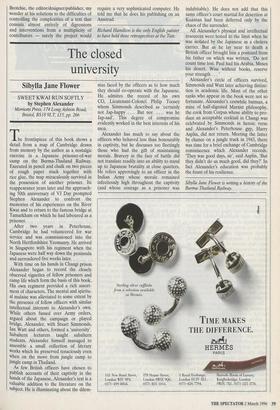The closed university
Sibylla Jane Flower
SWEET KWAI RUN SOFTLY by Stephen Alexander Merriotts Press, 174 Long Ashton Road, Bristol, BS18 9LT, £15, pp. 266 The frontispiece of this book shows a detail from a map of Cambridge drawn from memory by the author as a nostalgic exercise in a Japanese prisoner-of-war camp on the Burma-Thailand Railway. Executed in pencil and chalk on two pieces of rough paper stuck together with rice glue, the map miraculously survived in the possession of another prisoner. Its reappearance years later and the approach- ing 50th anniversary of VJ Day prompted Stephen Alexander to confront the memories of his experiences on the River Kwai and to return to the famous bridge at Tamarkham on which he had laboured as a prisoner.
After two years in Peterhouse, Cambridge he had volunteered for war service and was commissioned into the North Hertfordshire Yeomanry. He arrived in Singapore with his regiment when the Japanese were half way down the peninsula and surrendered five weeks later.
With time on his hands in Changi prison Alexander began to record the closely observed vignettes of fellow prisoners and camp life which form the basis of this book. His own regiment provided a rich assort- ment of characters. The mental and spiritu- al malaise was alleviated to some extent by the presence of fellow officers with similar intellectual interests to Alexander's own. While others fussed over Army orders, argued about the campaign or played bridge, Alexander, with Stuart Simmonds, Ian Watt and others, formed a 'university'. Subaltern lecturers taught subaltern students. Alexander himself managed to assemble a small collection of literary works which he preserved tenaciously even When on the move from jungle camp to jungle camp in Thailand.
As few British officers have chosen to publish accounts of their captivity in the hands of the Japanese, Alexander's text is a valuable addition to the literature on the subject. He is illuminating about the dilem- mas faced by the officers as to how much they should co-operate with the Japanese. He admires the record of his own CO, Lieutenant-Colonel Philip Toosey whom Simmonds described as 'certainly not Jap-happy . . . But nor . . . was he Jap-sad'. This degree of compromise evidently worked in the best interests of his men.
Alexander has much to say about the officers who behaved less than honourably in captivity, but he discusses too fleetingly those who had the gift of maintaining morale. Bravery in the face of battle did not translate readily into an ability to stand up to Japanese brutality at close quarters. He refers approvingly to an officer in the Indian Army whose morale remained infectiously high throughout the captivity (and whose courage as a prisoner was indubitable). He does not add that this same officer's court martial for desertion at Kuantan had been deferred only by the chaos of the surrender.
All Alexander's physical and intellectual resources were tested to the limit when he was isolated by the Japanese as a cholera carrier. But as he lay near to death a British officer brought him a postcard from his father on which was written, 'Do not count time lost. Paul had his Arabia, Moses his desert. Wise without books, reserve your strength . . . '
Alexander's circle of officers survived, Simmonds and Watt later achieving distinc- tion in academic life. Most of the other ranks who appear in the book were not so fortunate. Alexander's erstwhile batman, a mine of half-digested Marxist philosophy, the cook from Corpus whose ability to pro- duce an acceptable cocktail in Changi was celebrated by Simmonds in heroic verse and Alexander's Peterhouse gyp, Harry Asplin, did not return. Meeting the latter by chance on a jungle track in 1943, there was time for a brief exchange of Cambridge reminiscence which Alexander records. `They was good days, sir', said Asplin, 'But they didn't do us much good, did they?' In fact Alexander's education was probably the fount of his resilience.
Sibylla Jane Flower is writing a history of the Burma-Thailand Railway.


































































 Previous page
Previous page